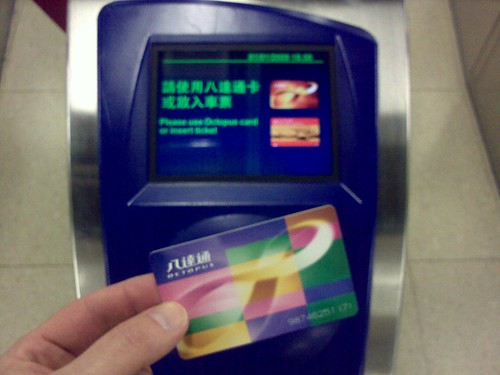e-money in Hong Kong
Those of you who have been to Hong Kong in the last decade certainly know of the Octopus card. For those who haven't, it is an e-money smart card that you can use for many, many transactions in Hong Kong. It operates like most touchless smart cards in most modern cities for subway and transit systems, but you can use it for way more things in Hong Kong, including all 7-11 and Circle K convenience stores, many chains of supermarkets, parking meters, vending machines, even Starbucks and McDonald's, and the place that does my laundry even takes Octopus. You can charge the card using cash or credit at anywhere that accepts the card. I impressed some South African friends the other day by buying them coffee and swiping my wallet to pay for it. Time from the cashier telling you the price of your order to you paying for it is typically about 1.5 seconds, no joke. You could easily go around Hong Kong carrying no cash if you wanted to, and of course the most awesome thing is that you never get change, nor have to carry, change. It really doesn't sound that impressive, but it has to be used to be believed.

I noticed today that the cafe that I'm writing this post from has started to establish their own e-money smart card. This is pretty brilliant from a business standpoint. Of course, they have to incentivize you to use their card, so they do so by making all card purchases 10% off. But because you have to pre-load the card, there is always the chance you end up not using the entire balance (whether you cease being a customer, you move away, or you simply lose the card), which is a win for them. But what is an even bigger win is that the card inspires customer loyalty to a far greater extent than any other similar program. It crushes their previous "buy 10 coffees and get the 11th free" loyalty program, even if the value to the customer is the same (10% off in either case). But because you almost always have a balance on the card, you're perpetually inclined to use it.
Of course, even though such schemes make perfect sense, it works better in Hong Kong -- where e-money cards have been in use for 13 years -- than it would in other cities. But it's interesting to see, right before my eyes and in brick-and-mortar stores, the latest transformation of money of being bills and coins to smart cards. Really, it's not a terribly dramatic change -- after all, money hasn't actually represented anything in my lifetime anyway -- but it's cool nonetheless.

I noticed today that the cafe that I'm writing this post from has started to establish their own e-money smart card. This is pretty brilliant from a business standpoint. Of course, they have to incentivize you to use their card, so they do so by making all card purchases 10% off. But because you have to pre-load the card, there is always the chance you end up not using the entire balance (whether you cease being a customer, you move away, or you simply lose the card), which is a win for them. But what is an even bigger win is that the card inspires customer loyalty to a far greater extent than any other similar program. It crushes their previous "buy 10 coffees and get the 11th free" loyalty program, even if the value to the customer is the same (10% off in either case). But because you almost always have a balance on the card, you're perpetually inclined to use it.
Of course, even though such schemes make perfect sense, it works better in Hong Kong -- where e-money cards have been in use for 13 years -- than it would in other cities. But it's interesting to see, right before my eyes and in brick-and-mortar stores, the latest transformation of money of being bills and coins to smart cards. Really, it's not a terribly dramatic change -- after all, money hasn't actually represented anything in my lifetime anyway -- but it's cool nonetheless.